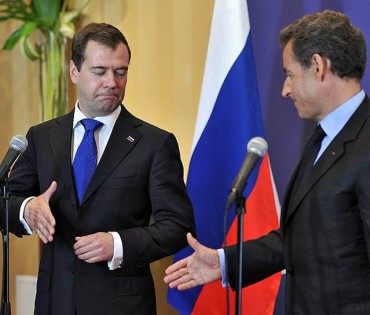An article written by Rebecca Damotte, intern of the Institute of World PolicyThe official statement has been made on 5th August. The two Mistral warships will finally not be sold to Russia, who will be entirely refunded. \
It would have to put an end to a long swirling story at least in theory.
Former French president Sarkozy and former Russian President Medvedev concluded the sale on 17th June 2011, during the symbolic Franco-Russian Year. The key elements of this contract were the two warships to be built in France.
Since the start of the negotiation between two countries, the signature of the contract has been fiercely debated in France and between its partners. French army officials as well as European and American partners expressed some reservations about it. Yet economic arguments and Sarkozy’s will to give a new twist to the Franco-Russian relations have been stronger than these concerns.
Opportunities were huge. First, the contract was about to bring employment in French shipyards that were desperately waiting for contracts. Secondly, a new era in the relations between the two countries was about to start. However, Russia played an ingenious game to get more than what France had agreed to at the beginning, as they understood Sarkozy wanted to sell these ships at all costs.
Once the contracts had been signed, the construction started. New election in France brought a new president François Hollande into the office. The Mistral case could have stayed unnoticed; if not Russian aggression in Ukraine put it back on the agenda of the French and Russian relations.
The annexation of Crimea and other violations of international law by the Russian Federation led the French government to “consider to suspend the delivery of the ships” early in 2014. It became the reality in September 2014. Continuing foreign pressure forced Hollande to put the contract on hold for two month. The suspension was reiterated in November, and the reboot of the sale was connected with the condition that Moscow would put an end to its interference in Ukraine.
So, the sale had been specifically linked to the implementation of Minsk agreements. As these agreements were not respected by Russia, Hollande announced that “the conditions” were “not favourable (for the sale)”, and thus the deal should be cancelled.
Yet, Russia will be totally refunded, and “the issue is closed”. But in France, it is not perceived as a closed issue. The political dimension and the Russian action in Ukraine are not perceived as reasonable arguments to stop selling the boats.
65% of the population was already against the suspension of the sale in Autumn 2014 (Source: online poll by l’obs). Economic fears prevailed over the political reasons and moral considerations. These economic fears had remained very strong among the French population ever since, as showed by the poll conducted in January 2015 by IFOP. 77% of the people feared negative consequences for the French economy if the sale would be cancelled.
Moreover, there is rising resentment towards the USA among the population. Americans are considered to have forced French President François Hollande to take the decision of cancelling the sale. The international sanctions against Russia are also perceived as an American initiative (76%), which for 52% of the population will not have any consequence on the conflict in Ukraine.
Now when the contract is cancelled, French still fear that it will have long-lasting consequences on their economy. They do not believe that the story is over. Who will buy the warships? How much will the cancellation really cost for the country? The dominating feeling is that the honour of the country has been shaded; that France is not perceived as a trustworthy and reliable partner any more. To sum up “Americans have pressured France to stop the sale, and now French people will have to pay”.
It appears that the economic reservations are considered as more important than ideals of democracy and respect of international law by the society, facing economic crisis and increasing waves of immigration.




Comments theme
Comments themeComments themeComments themeComments themeComments themeComments themeComments themeComments themeComments themeComments themeComments themeComments themeComments themeComments themeComments themeComments themeComments themeComments themeComments themeComments.